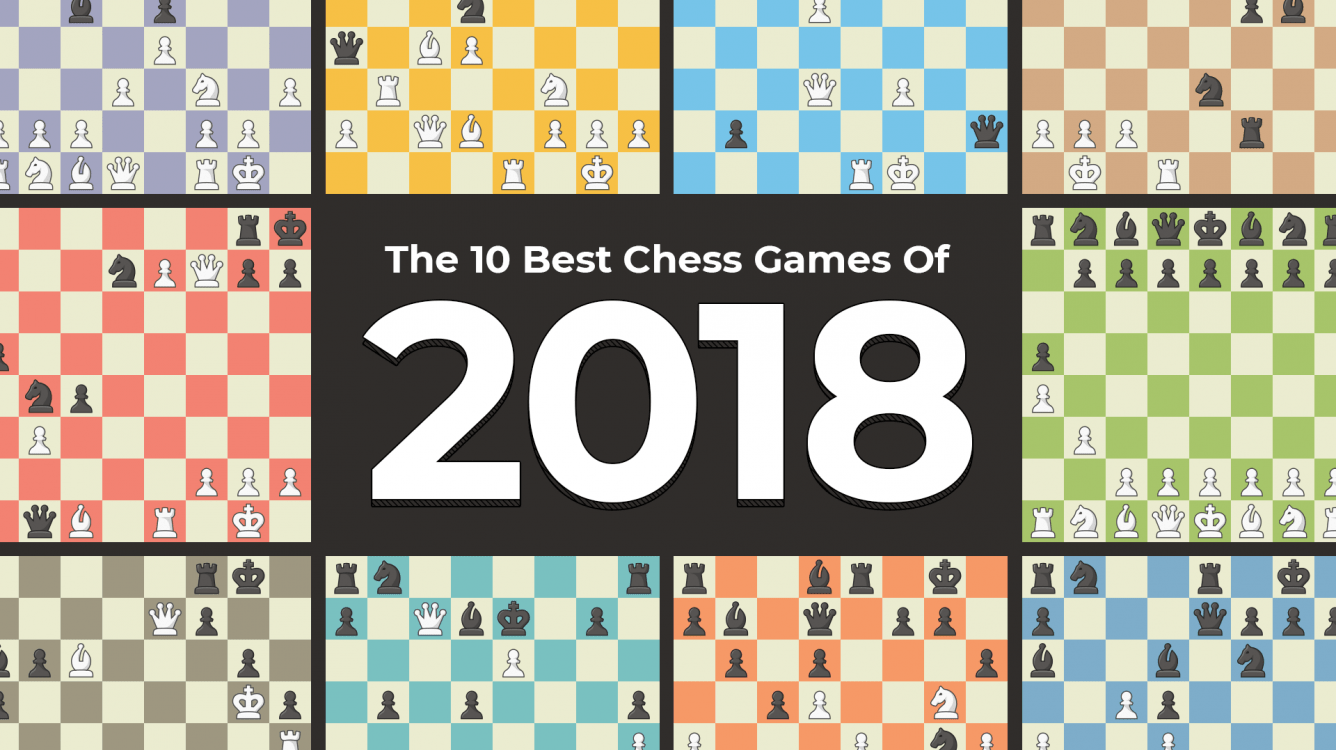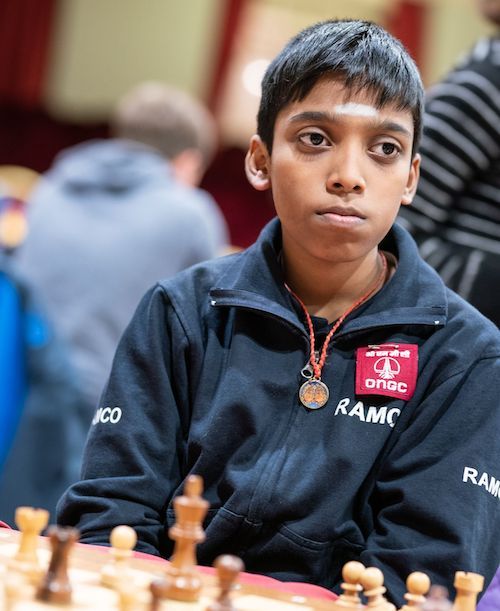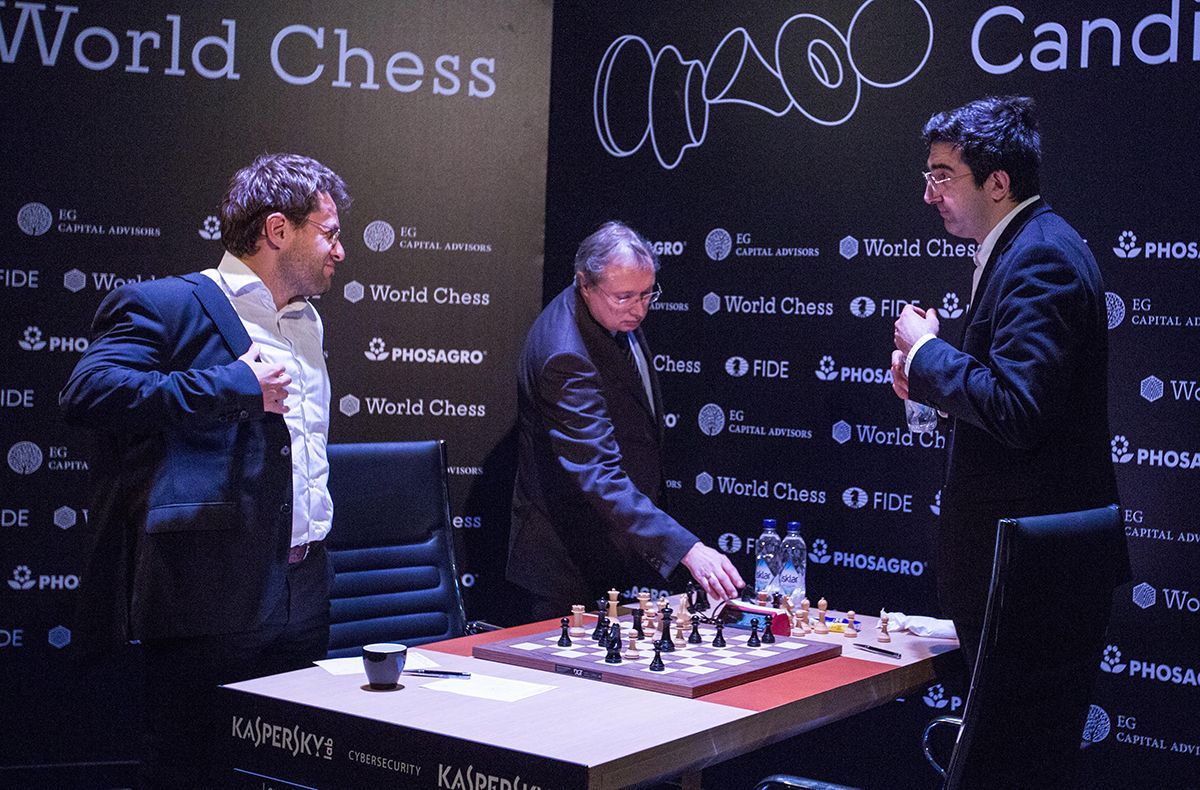
The 10 Best Chess Games Of 2018
With another year of chess history nearly in the books, what will fans remember most from 2018? The world championship draw-fest in London? Ding Liren's unbeaten streak? The FIDE regime change? Music as a weapon in esports?
Time will tell, but for now, let's leave all the off-the-board drama aside and focus on the best battles from the past year. Chess.com's content team (@peterdoggers, @danielrensch, @samcopeland, @Luisfsiles, @rakesh, @pete and @mikeklein) had the fun task of ranking the year's most memorable games.
Each person then voted on his 10 favorite games, with the top game getting 10 points, and the 10th-best game getting one point, and so forth.
 The favorite photo of the year from Chess.com's head of Russian social media—Maria Emelianova/Chess.com
The favorite photo of the year from Chess.com's head of Russian social media—Maria Emelianova/Chess.com
Below you'll find the list of the games finishing in 10th-1st place. Also not to be missed is an upcoming video series by GM Simon Williams of his own personal favorite games of the year.
- 10th: Jobava-Sulskis (Olympiad)
- 9th: Kramnik-Caruana (Candidates Tournament)
- 8th: Leko-Vachier-Lagrave (Olympiad)
- 7th: AlphaZero-Stockfish (London Match)
- 6th: Praggnanandhaa-Ravi, Chess.com IOM
- 5th: Ding Liren - Duda (Olympiad)
- 4th: Senpai-Stockfish (Chess.com CCC)
- 3rd: Paravyan-Golubov (Korchnoi Memorial)
- 2nd: Aronian-Kramnik (Candidates' Tournament)
- 1st: Hillarp Persson-Laurusas (Olympiad)
10. Jobava-Sulskis, Olympiad (16 points)
This game would likely have been at least an honorable mention simply because of the first two moves. When Baadur Jobava played top board for the host Georgians in September, his 1. b3 was answered by Sarunas Sulskis' 1...a5!? which in turn was parried by 2. a4!?
No, this wasn't the ghost of Tony Miles playing a four-year-old, this was the Olympiad! Sulskis went on to play a blistering attack. Despite being down a clean rook for the final 20 moves, Jobava's king never found safety and Lithuania came out on top in a wild 10th-place game.
 Baadur Jobava at the center of attention at the Olympiad. | Photo: Maria Emelianova/Chess.com
Baadur Jobava at the center of attention at the Olympiad. | Photo: Maria Emelianova/Chess.com
9. Kramnik-Caruana, Candidates' Tournament (17 points)
Vladimir Kramnik played some of the most entertaining chess at the Candidates' Tournament in Berlin—half of all his games produced a winner. Despite the quick departure of queens, this one lived up to the hype. Both players engineered passed pawns on the seventh at the same time, but by move 32 something even stranger happened. Every one of White's pieces was on the queenside, while nearly every one of Fabiano Caruana's was on the other side.
The American eventually allowed another pawn to the seventh as the former world champion enjoyed a four-on-zero pawn advantage on the queenside. Caruana ditched a whole rook, then both kings went walking. Whew, what can we say? This was even messier than the previous game!
 After this game, Vladimir Kramnik and Fabiano Caruana had much to discuss. | Photo: Maria Emelianova/Chess.com
After this game, Vladimir Kramnik and Fabiano Caruana had much to discuss. | Photo: Maria Emelianova/Chess.com
8. Leko-Vachier-Lagrave, Olympiad (18 points)
If we told you that Maxime Vachier-Lagrave would make the list, and that it would be a Najdorf, that will fall under the "minimally observant" file. The top Frenchman gets all sorts of fun positions by playing the uncompromising opening, but some players feel the need to keep challenging him on his home turf anyway!
Peter Leko tried his luck against MVL by accepting some sacrifices and then tap-dancing his king clear to the other side of the board. Black then eschewed the draw (you're not going to make this list with a repetition!) and went for glory just after the time control, despite being down a rook. 41...Bf6 is diabolical in its slowness but it was nevertheless correct!
 One of life's two classic blunders: Playing the Najdorf against MVL. | Photo: Maria Emelianova/Chess.com
One of life's two classic blunders: Playing the Najdorf against MVL. | Photo: Maria Emelianova/Chess.com
7. AlphaZero-Stockfish, London Match (19 points, including one first-place vote)
What to say? The downfall of humans as the apex creatures of earth begins with this game. AlphaZero shows no regard for whatever your chess teacher taught you.
Attack before castling? Sure. Leave a piece en prise? Yep. Push pawns on both rook files in the opening? Why not? Move your bishop from f1 to h3 then back to f1? Well, you get the point. Watch and unlearn!
The full peer-reviewed @sciencemagazine evaluation of #AlphaZero is here - a single algorithm that creatively masters chess, shogi and Go through self-play https://t.co/E3OPUOIFw4 pic.twitter.com/rEeuEseEil
— DeepMind (@DeepMindAI) December 6, 2018
6. Praggnanandhaa-Ravi, Chess.com Isle of Man International (20 points)
Well if computers won't take over the chess world, then tiny teenagers will. Pragg sacked a b-pawn, but that was pedestrian compared to what came later. Using his own organic computer, his brain (gasp!), he left his knight for the taking on e4, then forced his rook down Black's throat one move later.
The smash was essentially over after 24. e6! as Black's pieces were in a pitiful state. For most of the chess world, sorry, you've missed your chance to beat the young Indian.
 Despite what you've heard, "Prague" is not always so nice. | Photo: Maria Emelianova/Chess.com
Despite what you've heard, "Prague" is not always so nice. | Photo: Maria Emelianova/Chess.com
5. Ding Liren-Duda, Olympiad (27 points)
It almost seems unfair to highlight a Polish loss at the Olympiad when its squad made such an impressive run, but it would be equally unfair to leave out "Mr. Unbeatable" from 2018. Ding Liren's unbeaten streak reached triple digits despite him playing numerous top-flight players and playing on only one leg for the second half of the year!
The game had many romantic-era qualities, with White ripping open the center and then becoming singularly focused on the black king. Funnily enough, the struggle might have petered out much earlier were this not a team event, but Ding Liren forewent the early repetition after looking at his teammates games.
Although there was no specific criteria for judging, this game factored in a ton with the final placements in Batumi. That might be hard for some judges to ignore!
4. Senpai-Stockfish, Chess.com Computer Chess Championship (37 points)
Thanks to the pescatarian AlphaZero, Stockfish suffered in many games on the 2018 judging list. But the open-source aquatic beast gets the last swim with this fantastic games in Chess.com's Computer Chess Championship.
If the competition was for "move of the year" then you'd be hard-pressed to argue with 15...Bg3!!! For most of the game, Stockfish seems completely unconcerned about restoring material equality, at one point offering another minor piece to keep the pressure going.
Since no humans were involved, there's a decent chance this game slipped your radar, so be sure to check out the brutality:
3. Paravyan-Golubov, Korchnoi Memorial (39 points, one first-place vote)
And there's an even greater chance that this one will be a new discovery for many readers. While the Korchnoi Memorial wasn't even covered on our news section, this game begged for its own coverage.
In the second Petroff of our top-10 list, this one didn't come close to making it to the endgame. The 20-year-old GM David Paravyan ensured that by first offering his knight, then his knight and bishop, then his queen twice in a row, then a few pawns, then a rook. 2018 must be a banner year if that only gets you third place!
2. Aronian-Kramnik, Candidates' Tournament (49 points, three first-place votes)
Another strong choice for move of the year was much more understated in its beauty: Vladimir Kramnik's 7...Rg8!! He said he had found the move years earlier but didn't expect it to be useful against Levon Aronian, who was in the nascent stages of switching mostly to 1. e4 this year.
The former world champion followed it up more fireworks in a sacrificial but precise attack.
"One of the greatest games I have seen," Alexander Grischuk said. "Amazing from start to finish, absolutely unbelievable."
 Last moments of the Aronian-Kramnik game. | Photo: Maria Emelianova/Chess.com
Last moments of the Aronian-Kramnik game. | Photo: Maria Emelianova/Chess.com
1. Hillarp Persson-Laurusas, Olympiad (53 points, two first-place votes)
It seems 2018 was the year Tiger returns. No, not that Tiger. The Swedish grandmaster Tiger Hillarp Persson is not fully immersed in Go just yet—he's got a lot of creativity remaining in his chess game.
While not technically as "clean" as Kramnik's effort, there's no avoiding the joy of seeing a brave king cross the board in the middlegame. And not just to survive, but to play an active part in the checkmate.
Sure, there are obvious comparisons to Short-Timman (like Nigel Short, Hillarp Persson even used the f4-g5-h6 route), but the fact that nearly everyone mentally alludes to the same game is perhaps the exception that proves the rule. You shouldn't be able to do such a thing, and yet both men did.
Enjoy the king march and the best game of 2018!
 How to catch a Tiger? Don't chase him into your own den, that's for sure. | Photo: Mike Klein/Chess.com
How to catch a Tiger? Don't chase him into your own den, that's for sure. | Photo: Mike Klein/Chess.com
What makes a "best game" is of course subjective. Flashy sacrifice? Protracted struggle? The rise of machine learning?
What's clear from the results is that the bar was very high this year. Magnus Carlsen coming back from a piece down to beat Gawain Jones in Wijk aan Zee? Great stuff, but not top-10 material. Hikaru Nakamura's unrelenting effort of 135 moves to beat Valentina Gunina in Gibraltar? Barely made the list. The world champion playing the adventurous Portuguese Variation of the Scandinavian in the PRO Chess League and walking his king to f7 on move seven? Puh-lease. You gotta do better than that!
Here's a list of some pretty fantastic games that received at least one point, but nevertheless did not make it into the top 10:
- 15 points: AlphaZero-Stockfish, London Match
- 14 points: Carlsen-So, Tata Steel
- 12 points: LC0-Shredder 13, Chess.com Computer Chess Championship
- 11 points: Carlsen-Caruana, World Championship (Game 6)
- 9 points: Carlsen-Jones, Tata Steel
- 8 points: Stockfish-AlphaZero, London Match
- 6 points: Vaibhav-Carlsen, PRO Chess League
- 5 points: Aronian-Mamedyarov, Olympiad
- 4 points: Svidler-Mamedyarov, Tata Steel
- 3 points: So-Carlsen, Norway Chess; Caruana-Carlsen, World Championship (Game 10)
- 1 point: Karjakin-Caruana, Candidates' Tournament; Nakamura-Gunina, Gibraltar
Disagree completely? Want to guess the remaining games? Have an estimated date at which AlphaZero learns how to bankrupt the Federal Reserve? Let us know in the comments!






